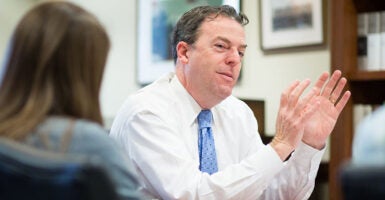New College of Florida needs a reorientation away from diversity, equity, and inclusion initiatives back to its original mission as Florida’s premier liberal arts honors college, according to Matthew Spalding, dean of Hillsdale College’s Van Andel School of Government and a trustee of the Florida college.
Florida Gov. Ron DeSantis, a Republican, appointed Spalding to New College’s Board of Trustees on Jan. 6 as part of the governor’s efforts to direct New College away from race and gender ideology and toward quality education. On Jan. 21, DeSantis announced changes for all Florida public schools, including New College, such as cracking down on critical race theory in curriculums and adding a core curriculum.
“There needs to be an assessment of how [New College] has strayed and why it is languishing,” Spalding told The Daily Signal. “I think a more robust liberal arts program will actually help build the school and draw more students to it.”
The Florida Legislature designed New College as a liberal arts institution. DeSantis’ overhaul of New College does not change the Sarasota school’s mission but returns it to its roots, Spalding argued.
“What’s going on here is a legitimate effort to redirect and reorient and bring the college back to its original mission, which is a great mission,” Spalding explained. “And serving on the board, I hope to help do that, especially with an emphasis on helping us to understand and directing towards its liberal arts mission.”
DeSantis said on Jan. 31 that the mission of New College has been characterized by “DEI, CRT, [and] the gender ideology rather than what a liberal arts education should be.” diversity, equity, and inclusion initiatives distract from New College’s founding mission, according to Spalding.
“I think that’s an improper and illegitimate way to run a college, so one responsibility is making sure those things are not distracting from serving the mission,” Spalding said. “The other is to oversee and make sure the institution keeps honest on its mission.”
Spalding said New College will be getting new leadership, who will ensure the college has a curriculum consistent with its mission. On Monday, the board voted to approve Richard Corcoran as interim president. Corcoran is a former state House speaker and education commissioner who also served on the state Board of Governors, which oversees Florida’s university system.
“Richard Corcoran and I have been friends for many years,” Spalding said. “Given his significant leadership experience in the Legislature and his long-term work in Florida education, he is well suited to guide New College through this transition as interim president.”
New College welcomes diversity of opinion, according to Spalding.
“Within the faculty, there will be more liberal and more conservative professors,” Spalding said. “There’s going to be a range of opinions and disagreements. We want to allow for that range. But I think the question will be, how do you rebalance? How do you refocus so that everyone is serving a common mission? That’s what a college is supposed to do.”
“The word ‘college’ means a partnership between faculty and students in that common mission, and I think the faculty and students and parents sending their kids to New College, they’re going to have to all think that through,” Spalding added.
Hillsdale College is a model for New College, Spalding said, but because New College is a public institution, it is responsible to the Florida Legislature.
“I think it is important to understand that good governance and fiscal accountability and academic excellence, all these things are being done in a way that is consistent with the laws of Florida,” Spalding said. “The significance of trying to recover or renew a liberal arts institution within a public university within a major state system is actually quite historic.”
The author of this article, Elizabeth Troutman, is a Hillsdale College student.
Have an opinion about this article? To sound off, please email [email protected] and we’ll consider publishing your edited remarks in our regular “We Hear You” feature. Remember to include the url or headline of the article plus your name and town and/or state.































